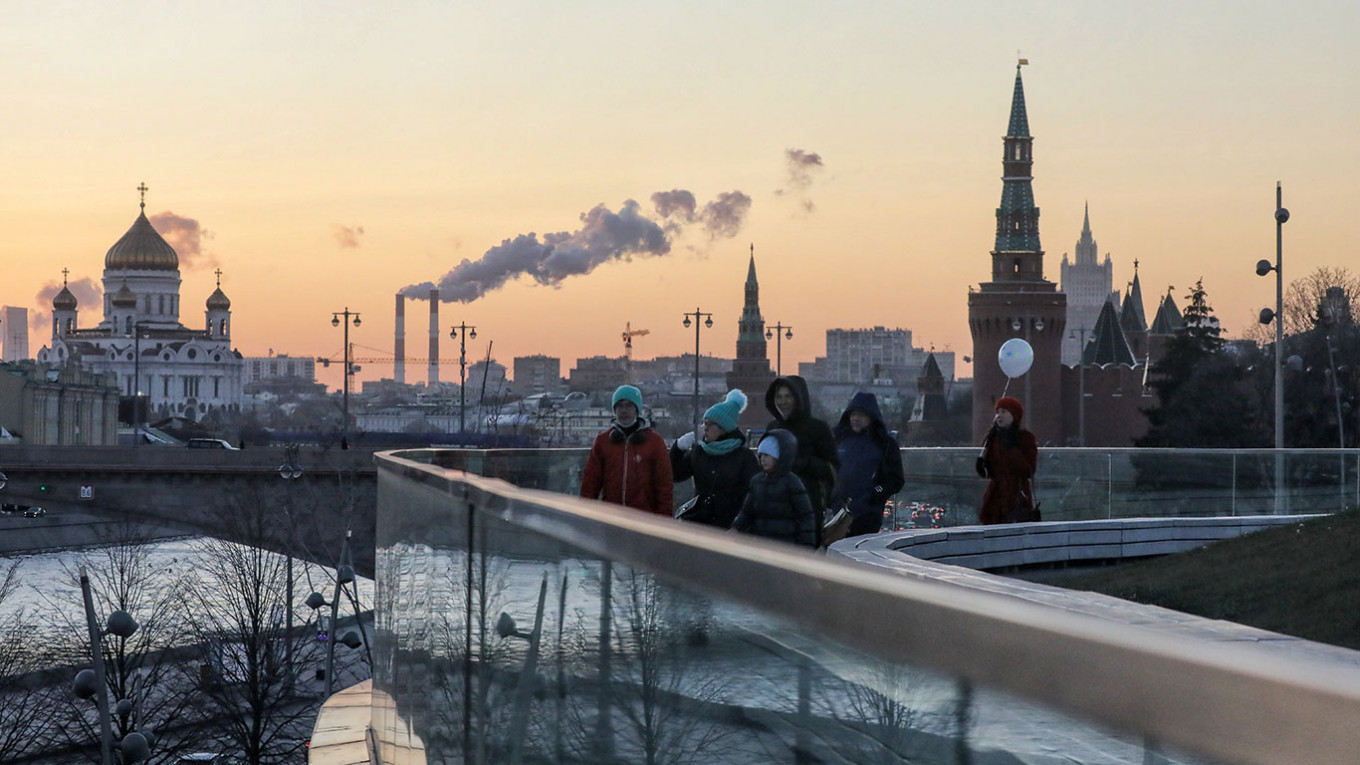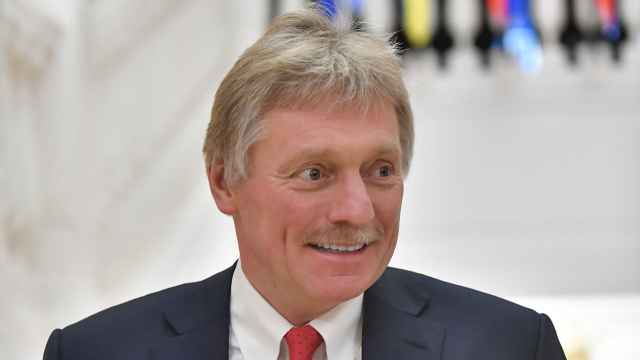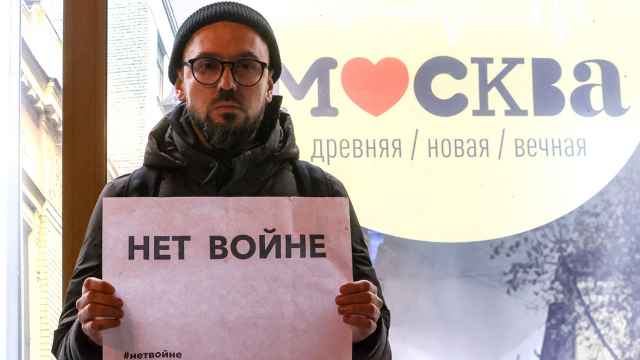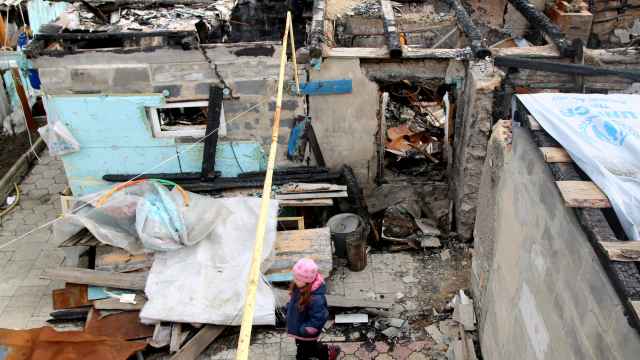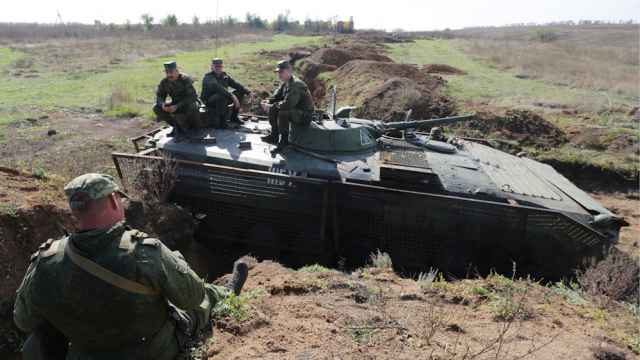As the owner of a central Moscow florist removed the red and white Valentine’s Day balloons decorating his shopfront, pedestrians strolled past enjoying a rare burst of winter sun, a scene in stark contrast to the cries of an impending war between Russia and Ukraine coming from the West.
Russia has amassed over 100,000 troops along its border with Ukraine since November, drawing increasing concern from the U.S. and its allies. Tensions reached boiling point this week as Washington claimed to have details of an imminent invasion, and even Russia’s announcement on Tuesday of the withdrawal of some of its forces has failed to calm the situation.
“It's the same old situation with the Americans,” Dmitry, a 49-year old Muscovite smoking a cigarette outside a metro station, told The Moscow Times with a laugh. “Nothing will happen, and then they’ll go around saying they beat everyone.”
As the West has repeatedly sounded the war alarm, the Kremlin has insisted it has no such plans. Instead, Moscow accuses the U.S. and NATO of threatening its security by expanding into eastern European countries like Ukraine, which it sees as being within its sphere of influence — and is demanding binding security guarantees.
Civilians in the Russian capital were inclined to agree with their government.
“There is no attack from Russia on Ukraine, I don’t even believe one was planned,” said a retired IT specialist who declined to give his name.
“Yes, of course the relationship between the two countries is complicated, but there was no question of any attack; it was invented by the Americans,” said another man, a 67-year-old Ukrainian who has spent much of his life in Moscow.
Despite the latest troop buildup and the souring of relations that took place after Russia annexed the Crimean peninsula and conflict broke out in eastern Ukraine in 2014, Russians continue to play down the prospect of another war.
“Putin is very smart, he wouldn’t allow war, especially not between Ukrainians and Russians, we are one people with almost the same language, why would we fight our brothers? It is stupid,” said 50-year-old Savely, an unemployed Muscovite.
Hopes that war can be avoided were bolstered when Moscow said it would pull back some troops following the end of their drills near Ukraine. However, despite this initial signal of de-escalation and a flurry of diplomatic talks between the Kremlin and Western powers, no agreement has been reached on the future of Ukraine’s NATO aspirations.
Since the 2014 Maidan uprisings ousted Ukraine’s pro-Russian president and triggered the annexation of Crimea, Russo-Ukrainian relations have continued to deteriorate as Kyiv has gradually aligned itself more with the West.
Kyiv joining NATO would bring U.S.-led forces even closer to the Russian border, a move the Kremlin has warned it will not tolerate.
“Nationalism has risen very strongly in Ukraine lately and even though it is not encouraged by the authorities, no one has done anything to prevent it,” said the Ukrainian passerby who declined to give his name, “and because everyone is saying there will be a war, there are a lot of additional weapons circulating, and a lot of weapons in the hands of the wrong people can easily lead to conflict.”
Sanctions threat
Despite Russian concerns over NATO enlargement, the West has continued to denounce what it views as aggressive behavior from Russia.
The U.S. and its allies have also threatened Russia with unprecedented sanctions that would target its financial and energy sectors if it invades Ukraine.
But Russia — learning from the major wave of sanctions that followed its annexation of Crimea — has shored up its economy against potential sanctions, and the Kremlin has repeatedly voiced a readiness to endure whatever Western penalties come its way.
This approach jars with younger Russians, who tend to favor an integrated Russia that is more attuned with Western customs and worldviews.
“People always say that someone must be to blame, but I don’t think that one side is more to blame than the other here, there have been mistakes on both sides,” said Liza, 19, a Muscovite who said she was between jobs.
“Let us just have peace, we don’t need a war or hostile relations, we just need a conclusion that ensures we have peaceful relations with each side,” she said.
A Message from The Moscow Times:
Dear readers,
We are facing unprecedented challenges. Russia's Prosecutor General's Office has designated The Moscow Times as an "undesirable" organization, criminalizing our work and putting our staff at risk of prosecution. This follows our earlier unjust labeling as a "foreign agent."
These actions are direct attempts to silence independent journalism in Russia. The authorities claim our work "discredits the decisions of the Russian leadership." We see things differently: we strive to provide accurate, unbiased reporting on Russia.
We, the journalists of The Moscow Times, refuse to be silenced. But to continue our work, we need your help.
Your support, no matter how small, makes a world of difference. If you can, please support us monthly starting from just $2. It's quick to set up, and every contribution makes a significant impact.
By supporting The Moscow Times, you're defending open, independent journalism in the face of repression. Thank you for standing with us.
Remind me later.



